Anton Skorucak, MS
Anton Skorucak is a founder and publisher of ScienceIQ.com. Anton Skorucak has a Master of Science (MS) degree in physics from the University of Southern California, Los Angeles, California and a B.Sc. in physics with a minor in material science from the McMaster University, Canada. He is the president and creator of PhysLink.com, a comprehensive physics and astronomy online education, research and reference web site.

Science Facts Written by Anton Skorucak, MS
What are Hoodoos?
Hoodoos or Goblins are one of the most spectacular displays of erosion. They are geological formations, rocks protruding upwards from the bedrock like some mythical beings, conveying the story of ... Continue reading

Antimatter Discovery
In almost every science fiction movie ever made, you are bound to hear about antimatter –– matter-antimatter propulsion drives, whole galaxies made of antimatter, and so on. Antimatter has been used ... Continue reading
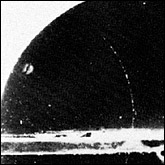
The Weakest Force
Did you know that gravity is the weakest force in the universe? Well, it's true! There are four fundamental forces (that we know of) in our universe: Strong Nuclear, Electromagnetic, Weak Nuclear ... Continue reading

Carbon Dating From The Skies
Determining the age of relatively recent fossils, those of plants and animals that lived tens of thousands of years ago, is not a guessing game but an exact science. By using carbon dating we can ... Continue reading
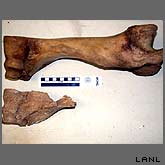
Hybrid Cars: The Magic Braking
You have undoubtedly seen one of the hybrid cars on the road. You probably heard that they are unlike any other fossil fuel or electric car. They are sort of both. ... Continue reading

Neutrinos to the Rescue
Have you ever wondered what the most abundant particle in the universe is after photons of light? The answer is: Neutrinos. These tiny, neutral and almost mass-less particles that move at almost the ... Continue reading
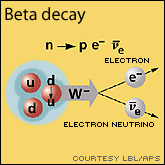
Why does popcorn pop?
Popcorn is the most amazing food! It all starts with a kernel only several millimeters in diameter which explodes into a 40-50 times bigger fluffy, tasty, white wonder. The kernel is made of three ... Continue reading
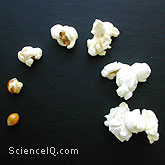
Perfect Numbers
Some numbers are more special than others. According to Pythagoras (569 BC - 475 BC) and Euclid (325 BC - 265 BC), some are so special that they called them mystical or perfect numbers. The first ... Continue reading

Was Popeye Wrong?
When you think of Popeye the Sailor what is the first thing that comes to your mind? It is probably spinach. Popeye used to get extraordinary strength as soon as he munched down a can of spinach. ... Continue reading

318 Times as Massive as Earth
What is 318 times more massive than Earth? Jupiter, the fifth planet from the Sun (next in line after Earth and Mars). Jupiter is the largest planet in our Solar System. If you decided to take a ... Continue reading
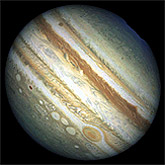
Ice That Burns
What looks like regular water ice but hisses and jumps around like water on a hot plate when you put it on a room-temperature surface and bursts into flame when you light it up? It is a rare and ... Continue reading
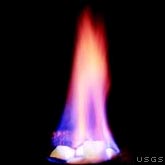
Lunar Explorations
Ever since the beginning of intelligent life on Earth, the moon has been a focal point of human curiosity. Galileo’s discovery in 1610 that the moon had craters, valleys and mountains, instead of the ... Continue reading
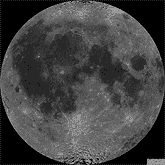
Batesian Mimicry
If you ever got stung by a wasp you would probably avoid all flying insects which resemble the brightly-colored yellow and black wasp. If you were a bird and certain types of butterflies gave you a ... Continue reading
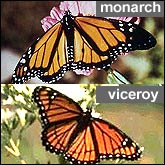
Is the Dead Sea really dead?
The Dead Sea is located on the boundary between Israel and Jordan at a lowest point on earth, at 400 meters (1,320 feet) below sea level. All waters from the region, including the biggest source, the ... Continue reading
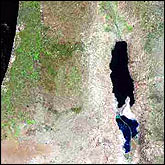
The Handsome Betta Fish
The Betta fish is possibly the most handsome tropical fish out there. We say handsome because the male of the species is the bigger and more exotic one. Referred to as the jewel of the Orient, Betta ... Continue reading
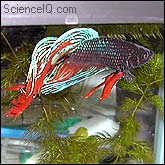
How Fast is Mach 1?
A Mach number is a common ratio unit of speed when one is talking about aircrafts. By definition, the Mach number is a ratio of the speed of a body (aircraft) to the speed of sound in the undisturbed ... Continue reading
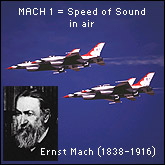
Delivered by TIR
The content of this article has been delivered to you via internet fiber-optic links. Today most phone conversations, fax transmissions and almost all internet and email traffic travel at the speed of ... Continue reading
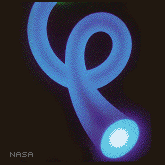
Will the Sun Shine Forever?
The Sun is a huge nuclear furnace. It operates by converting hydrogen into helium. In this process, which is called nuclear fusion, it loses mass and produces energy according to Einstein's famous ... Continue reading
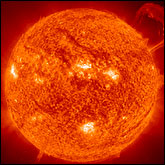
Laser Guide Stars
Did you ever wonder why we have to have the Hubble Space Telescope so high up in the Earth's orbit? Why not just make a bigger and better telescope on the surface? ... Continue reading
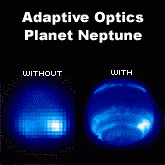
Earth's Magnetism
Most ancient civilizations were aware of the magnetic phenomenon. Sailors in the late thirteenth century used magnetized needles floating in water as primitive compasses to find their way on the sea. ... Continue reading

The Early Universe Soup
In the first few millionths of the second after the Big Bang, the universe looked very different than today. In fact the universe existed as a different form of matter altogether: the quark-gluon ... Continue reading
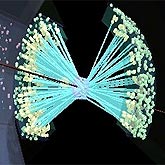
The Great Permian Extinction
More than 250 million years ago, when the current continents formed a single land mass, known as the Pangea and there was one super-ocean called Panthalassa, something extraordinary happened. Nearly ... Continue reading
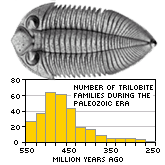
Is Earth Getting Fatter Around the Belt?
Besides being used for transmission of this email message to you, communication satellites are used for some neat science. By shooting a laser beam onto them and measuring how long it takes for light ... Continue reading
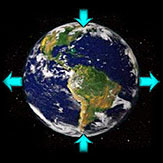
Solid Smoke
Ever wondered what is the least dense solid in the world? Well, it is the so called Solid Smoke aerogel developed decades ago by aerospace engineers and recently perfected to its newest, lightest ... Continue reading
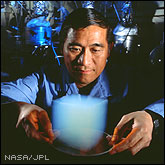
The Journey of the Monarchs
The life of Monarch butterflies is an amazing one. They develop as caterpillars from the roughly 400 eggs each mother lays on the underside of milkweed plant leaves. Then they spend their brief lives ... Continue reading
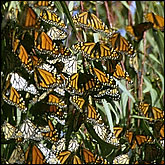
Bicycle Chain for Fleas
Sandia National Laboratories has engineered the world’s smallest chain. The distance between chain link centers is only 50 microns. In comparison, the diameter of a human hair is approximately 70 ... Continue reading
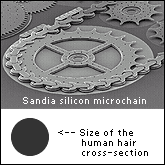
Gestation Periods of Mammals
Gestation period is the time from fertilization to the actual birth in animals. In humans this period is 266 days or approximately 9 months. ... Continue reading

New York to London in Less Than Two Hours
If flying from New York (USA) to London (UK) in less than two hours sounds like science fiction, continue reading. On September 1, 1974 Major James V. Sullivan, 37 (pilot) and Noel F. Widdifield, 33 ... Continue reading
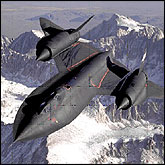
Single Molecule Electroluminescence
Incandescence and luminescence are two main ways of producing light. In incandescence, electric current is passed through a conductor (filament of a light bulb for example). The resistance to the ... Continue reading
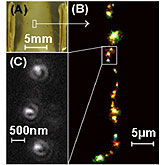
Mobius Strip
A Mobius Strip is an amusing three-dimensional object whose surface has only one side. Huh? Well, most objects you can imagine have a surface with two sides. For example, an ordinary piece of paper ... Continue reading
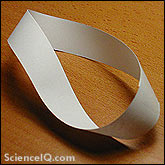
You, Graphite and Diamonds
Living things, including you and me, and diamonds, are made of the same substance: the element carbon (C). Carbon atoms in our bodies are bound to other atoms, such as hydrogen and oxygen, in organic ... Continue reading
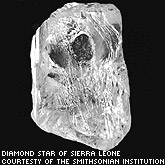
Quarks
Quarks are the most fundamental particles that we know of. Both protons and neutrons are made of quarks. We know quarks exist; we have experimental proof. However nobody has been able to isolate them; ... Continue reading
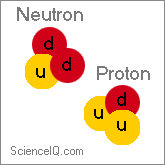
Diamonds Improved by Irradiation?
Besides hardness and texture, probably the most fascinating aspect of gems is their color. There are so many different and wonderful clear and foggy gems with colors that span almost the complete ... Continue reading
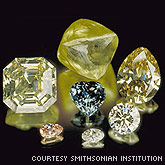
Kepler's Conjecture
Take a bunch of oranges that are similar in size and try to pack them into a cardboard box. What is the most efficient orange arrangement so that you fit the most oranges into the box? Should you ... Continue reading
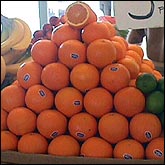
Vitreous Humor, Sclera and Other Yukky Eye Stuff
Eyes are one of the most complex organs humans have. In fact the optic nerve connection to the brain is so complex and delicate that no one has ever succeeded in transplanting the whole eye (the ... Continue reading
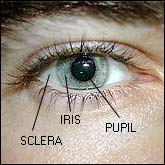
The Science of Tears
When was the last time you had a good cry? Shedding tears may be healthier than you thought, and the secret lies in the chemical composition of tears. ... Continue reading
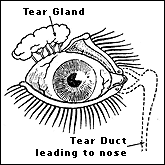
Poincare's Chaos
Over two hundred years after Newton published his laws of planetary motion the King Oscar II of Sweden and Norway sponsored a most unusual competition that would discover a whole new science. ... Continue reading

